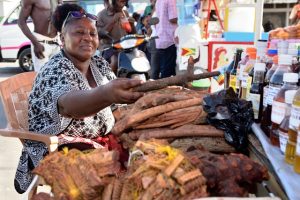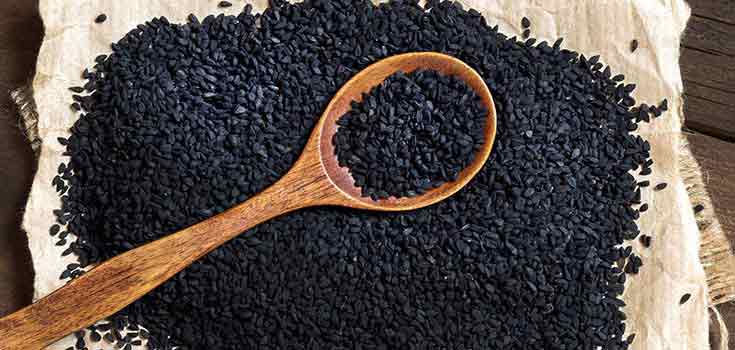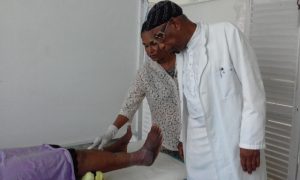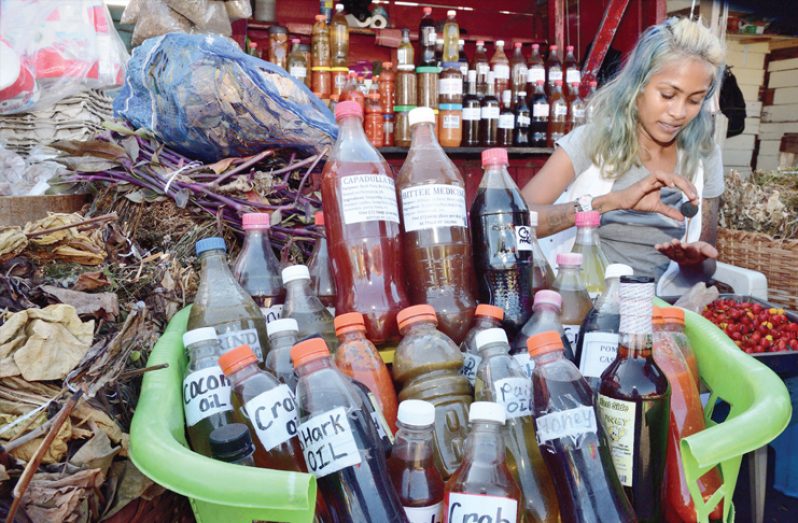
FOR centuries upon centuries and long before world-renowned scientists or state-of-the-art hospitals, mankind in his aboriginal state, remedied all of his illnesses through the existence of nature’s creations.
Today, there are pills which serve a range of purposes from the simple pain relief to the much contentious birth control, even as scientists now join efforts to find a single cure for cancer and AIDS.
The likes of pills have come to be known as ‘traditional medicine’; other treatments such as herbal remedies have fallen into the category of ‘alternative medicine’, alluding to practices which are unproven, disproven or impossible to prove.
In Guyana, both forms of medicine are widely practiced, but due to the absence of a national regulatory authority, those who seek to make a living off alternative medicine are significantly disadvantaged.
Pay a visit to the well-known Bourda Market in the capital city, a 20th century structure named after a former plantation owner, and one would indeed see that its outer parts are populated with vendors seated behind stands of various bush remedies.

“We get things like tea bush, cold bush and bitters in various types. Tea bush is like fever, daisy, lemongrass, sweet sage; bitters bush is like pear leaf, zeb grass, corilla and sweet broom. We get bush for other purposes like sugar (diabetes), [high] pressure and high cholesterol,” rattled off Anjie Mohammed, a young woman who has flawlessly memorised their use.
She proudly told this newspaper that this line of business has been in her family for years and she took interest in it since as a child.
In continuing her plug, she held up for display a bottle of medicine with 21 different bushes combined to remedy the common cold; she recommends it in various dosages to customers.
Later, speaking to the benefits of the herbs, Anjie said: “It’s very good fuh the body, very, very good. My grandmother had a case and she used to take bush and use she aloe and them things and now she get thick and healthy again.”
Another vendor had a host of barks good for menstrual issues and sexual stamina, just to name a few.
The main supplier of the bush herbs to the vendors at the market is a 47-year-old farmer and vendor nicknamed Harry “I mend it, blend it” Beepat.
Beepat has a five-acre farm in North Ruimveldt, Georgetown and proudly told this newspaper that he utilises no inorganic fertiliser.
NEED EXPORT MARKET
Speaking about the daily running of his business, he said: “It don’t really run how yuh want it run, ‘cause you see, we don’t have export market. If the government could get export market for us it would be better, because people would be able to benefit.”
When asked their thoughts on the implementation of a regulatory body to vet their herbs prior to sale, most of the bush vendors welcomed the idea, as long as it meant that it would increase public confidence in their trade.
“My advice that they [the government] shouldn’t waste more time, they should have gotten it already,” said Linden Garnett, another vendor who has been in the trade for over 30 years.
The interest of making a living is priority for most bush vendors. However, other individuals such as well-accepted naturopathic specialist Dr. Joseph Haynes, who practises both sides of medicine, believes that more is needed to regulate the sale of bush remedies.
“You just don’t use bush just like that and call it medicine,” he said.

MUST BE CERTIFIED
He added that he believes that all persons practising “bush medicine” must be certified, trained and monitored, so that the right dosage, age group and other criteria are considered.
“We don’t know the conditions under which those things are prepared; we don’t know the water that they use to extract from whatever bush they’re using; we don’t know the combination of how many leaves or stems they’re using,” Dr. Haynes pointed out.
However, he was sure to add: “Most of the drugs that are formulated in the world, the base of the drug comes from herbs or natural medicine, so we cannot say that natural medicines don’t work. What we need to say is how much of it needs to be taken or how it’s prepared.
And, do we have regulations in place that would have been tested, certified, proven that this will work for whatever condition you say it’s going to work for?”
Haynes wants to see the resumption of debate in Parliament on the Allied Health Professions Bill – Bill#15 of 2009, which states that professionals must enter a regulatory register and be issued a licence prior to practice.
His intentions were shared by founder and executive director of the Guyana Association for Alternative Medicine Institute (GAAMI), Dr. Iamei Aowmathi, who said that the body had once submitted its own proposals to the Special Select Committee reviewing the bill.
Dr Aowmathi holds a Phd in psychology and a healing practitioner’s diploma in holistic medicine from the school of HP Kollege, Munich, Germany.
This month he will speak at the Caribbean Tourism Organisation (CTO) conference on the State of the Tourism Industry with attention on the benefits of alternative medicine in the Caribbean.
Back in 2009, GAAMI had urged the then Minister of Health, Dr. Bheri Ramsaran, to establish GAAMI, along with a board of directors, as the regulatory body which would provide local “bush doctors” or herbalists with certification to practise their trade.
Now, with a new administration in office, Dr. Aowmathi is again appealing on behalf of the association, which he reminded is accredited by the National Accreditation Council of Guyana.
“We need to know, in our societies, who are the authentic practitioners and that is why we formed the association. We are asking and have been asking practitioners of this type of medicine to register with us and we went a little bit further and we formed, the Guyana Association for Alternative Medicine Institute, whereby we are making sure that people are trained in these fields of medicine,” he said.
The training ranges from the growth, collection and packaging of herbs, along with practical training from the institute’s clinic, the BAKJA Health Movement, which is the only one in Guyana for treatment with indigenous and traditional medicine.

GAAMI even offers certification training to “bush vendors” through a six-month course, which Dr Aowmathi said is not being viewed as essential by most vendors.
“We’ve been offering to the vendors all the time. I have gone down to the Bourda Market, some of them know me, and I have spoken to them and one and two of them have come, but they have stopped coming,” he said.
EMBRYONIC STAGES
Minister within the Ministry of Public Health, Dr Karen Cummings, said the establishment of a national regulatory authority is still in the “embryonic stage.”
“We have to have a stakeholders’ meeting initially, but it’s still under consideration. It’s something we talked about on policy level. We haven’t accepted it as yet and we’re still doing research, but it has to be regularised,” the minister asserted.
Meanwhile, many locals continue to utilise the large variety of herbs available to treat conditions for both temporary and terminal illnesses.
One year ago, a young woman by the name of “Melissa” was diagnosed with brain cancer and now, apart from the prescriptions of her doctors, she has put her faith in a plant well known to the Muslim community as Black Seed.
The plant’s scientific name is Nigella sativa and has historically been used for headache, asthma, arthritis, toothache, nasal congestion, intestinal worms and cancer.
It is easily accessible at some local masjids, Melissa said, stating that she has been using the plant for some two months now.
“I’m much healthier and I’m still alive. A lot of things have changed in my body since I started using it,” she said, detailing that the seeds can be ground and sprinkled on food, boiled, or eaten as is.
Questioned further on her choice to rely on the type of medicine, she stated: “Natural medicine has been used over thousands of years and who am I to say that it won’t work? Before doctors and medications and all these things were created, natural medicine is what our foreparents used.”
This is a belief shared by a group that calls itself Medicine From Trees and one of its members Veronica Farias. Veronica joined the group in 2006, after hearing about it on the radio while at home in her community Kwatamang, North Rupununi.
The group comprises women from different Amerindian communities and sells four categories of products namely oil, soaps, salves and tinctures.
In 1994, the Makushi Research Unit (MRU) examined the medicine used by the group and found some to be medically sound to treat common illnesses.
BOOKLET
With the assistance of a UK expert, the unit subsequently compiled a booklet of a list of herbs available and the illnesses they can treat.
“Some of the products that we use, there are so many of them in the book that they did research on. Like for diarrhoea, diabetes [and] arthritis; there are so many plants that are used for that purpose,” Farias told this newspaper.
Today, one of the group’s most demanded products, kiambe tincture, is used to help women treat early-stage cervical cancer.
“That’s making a great impact on our market, where a lot of people are saying it’s very effective for early-stage cervical cancer. So, we’re sending to Region Two right now and we would send by 100 bottles or so… these are all products that we’re selling that people who know about it keep passing the message to other people saying ‘yes, these products are very effective’,” she said.
However, Farias went on to explain that with no form of regulation in place to certify the products as safe, not all persons are open to trying them out.
“What we are going through right now is that our business is not registered, even though we’ve existed for long. So, we’re in a process where our members are thinking about where we should go, because this business needs to be legalised in terms of selling our products. We are getting challenges where some of our customers would ask, ‘how do you test this product’ and we don’t test them [through a general governing body]; we make them based on the research we did,” the woman said.
Medicine From Trees also displays its products in Georgetown at the Inter-American Institute for Cooperation in Agriculture (IICA) and at various exhibitions.
She added that beginning in 2019, despite the absence of a body, Medicine From Trees will work to improve its branding, packaging or anything that can be used to enhance their products.
This may become easier for some suppliers. As Minister Cummings told this newspaper, that along with the establishment of a national regulatory authority would come capacity-building, to ensure that those in the field can do their jobs competently.
As many await this needed change, the practice of herbal medicine remains fundamental to the well-being of many indigenous people living in remote areas without easy access to medical attention in cases of emergency.
In addition, many elderly Guyanese place their confidence in the healing properties of nature, even as they pass on the blueprint to their children and grandchildren as a means of protection.
These reasons and more are why Farias, too, puts her trust in the trade.
“It’s our belief that the nature God gave us — the plants and the things that surround us — He gave us those natural healings and they are very good. I directly extract the products from the tree itself, so I know and I trust it. Many times I would see medicine on the shelf and I don’t know where it comes from, but from my experience, the reason I feel safe using natural medicine is because it’s all found in our surroundings and we are surrounded by medicine in our community,” she said.




.jpg)










